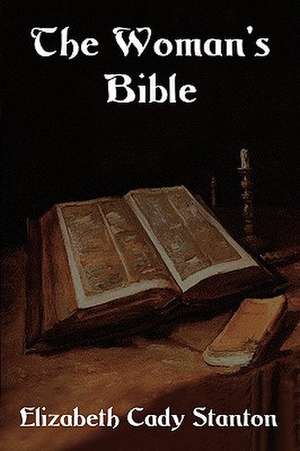The Woman's Bible
Autor Elizabeth Cady Stantonen Limba Engleză Paperback – 31 mai 2010
| Toate formatele și edițiile | Preț | Express |
|---|---|---|
| Paperback (6) | 117.51 lei 3-5 săpt. | |
| Mint Editions – feb 2021 | 117.51 lei 3-5 săpt. | |
| SMK Books – 23 oct 2010 | 128.37 lei 6-8 săpt. | |
| Bibliotech Press – 28 feb 2014 | 142.14 lei 6-8 săpt. | |
| Indoeuropeanpublishing.com – 31 mai 2010 | 146.99 lei 6-8 săpt. | |
| Book Jungle – 7 sep 2009 | 202.00 lei 6-8 săpt. | |
| TREDITION CLASSICS – 30 noi 2011 | 302.09 lei 6-8 săpt. | |
| Hardback (3) | 170.90 lei 3-5 săpt. | |
| Mint Editions – feb 2021 | 170.90 lei 3-5 săpt. | |
| Bibliotech Press – 27 iul 2019 | 240.41 lei 6-8 săpt. | |
| SMK Books – 3 apr 2018 | 242.35 lei 6-8 săpt. |
Preț: 146.99 lei
Nou
Puncte Express: 220
Preț estimativ în valută:
28.13€ • 29.43$ • 23.36£
28.13€ • 29.43$ • 23.36£
Carte tipărită la comandă
Livrare economică 02-16 aprilie
Preluare comenzi: 021 569.72.76
Specificații
ISBN-13: 9781604442748
ISBN-10: 1604442743
Pagini: 340
Dimensiuni: 152 x 229 x 19 mm
Greutate: 0.5 kg
Editura: Indoeuropeanpublishing.com
ISBN-10: 1604442743
Pagini: 340
Dimensiuni: 152 x 229 x 19 mm
Greutate: 0.5 kg
Editura: Indoeuropeanpublishing.com
Notă biografică
Elizabeth Cady Stanton (1815-1902) was a leader of the U.S. women¿s rights movement. Born to a powerful New York family, Stanton was raised by a conservative father and progressive mother. Although both of her parents were politically active¿her father was a congressman and later a New York Supreme Court justice; her mother was a campaigner for abolition and women¿s suffrage¿Stanton, who excelled in school, gravitated toward the radical politics of her mother as she entered adulthood. In 1848, she was instrumental in establishing the Seneca Falls Convention on women¿s rights, where she controversially demanded that white American women be granted the right to vote. In 1851, she met Susan B. Anthony, with whom she established several organizations to campaign for abolition and women¿s suffrage, shifting during the war to a platform advocating for voting rights to be granted to African Americans and women before opposing the Fifteenth Amendment on the grounds that it afforded African American men the right to vote while denying women the same privilege. After the Civil War, Stanton, alongside Anthony, formed the National Woman Suffrage Association, branching off from the larger suffrage movement to advocate for the right for white women to vote. Despite this controversial decision¿she was widely criticized by members of her own movement as well as such prominent African Americans as Frederick Douglass¿Stanton remains a crucial figure in the history of women¿s rights in the United States.
